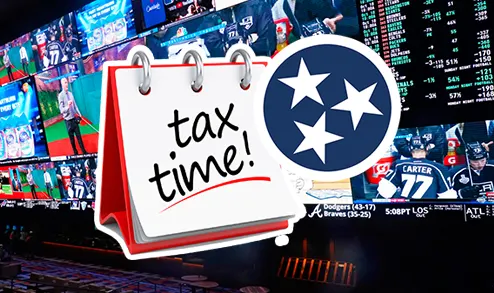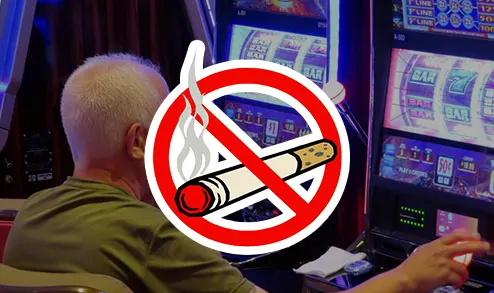 Tennessee became the first state to tax sports betting operators on the total gross wagers instead of revenue after Governor Bill Lee signed Senate Bill 475 into law on May 17. The new law imposes a 2% gross wager tax, replacing the previous tax of 20% on adjusted gross income. Under the new law, sports betting operators are no longer required to partner with Genius Sports for NFL official league data and hold 10% of their handle on an annual basis.
Tennessee became the first state to tax sports betting operators on the total gross wagers instead of revenue after Governor Bill Lee signed Senate Bill 475 into law on May 17. The new law imposes a 2% gross wager tax, replacing the previous tax of 20% on adjusted gross income. Under the new law, sports betting operators are no longer required to partner with Genius Sports for NFL official league data and hold 10% of their handle on an annual basis.
What are the New Requirements for Licensed Sports Betting Operators?
Licensed betting sites began accepting sports wagers in Tennessee in 2020. Similar to all other states that legalized online sports betting, the state taxed operators based on their adjusted gross gaming revenue. Before Governor Lee signed Senate Bill 475 into law, operators were required to use official league data to settle in-play wagers. Besides, licensees had to pay a 10% tax on all wagers.
But that is already in the past because Tennessee Governor Lee approved Senate Bill 475, which was introduced in January this year. In April, the legislation was passed by the Senate on a 30-0 vote. Shortly after that, the bill passed the state’s House of Representatives with a 75-7 vote.
The new law came after several sportsbooks failed to hit the 10% hold. The betting operators who found themselves unable to comply with the state’s 10% hold rule decided to pay a $25k fine instead of the difference between what they paid in taxes and the amount they would pay if they met the requirement. The Tennessee Sports Wagering Advisory Council (SWAC) believed this led to significant losses for the state, amounting to $10 to $12 million in revenues.
Sports Wagering Advisory Council reported that the total sports handle in Tennessee saw a dramatic year-on-year growth of 9%, reaching $318.4 million this April. Adjusted gross income for the month was $32.2 million, while the state collected $6.4 million in taxes. Licensed betting sites paid out a total of $284.1 million in wins.
The Reason Behind Tennessee’s Decision to Changed Its Sports Betting Tax System
Tennessee adopted the new rules in a bid to maximize revenue for the state government. The new law is projected to boost Tennessee’s revenue by $7.36 million annually by fiscal year 2024. It is unclear whether the new law will produce the desired effects. According to industry experts, the new tax regime is a double-edged sword as the state may experience a revenue decline if the handle dips.
Senate Bill 475 was not the only legislation that sought to change the state’s sports betting tax system. House Bill 1362, which was also introduced in January, proposed a 1.85% tax on operators’ handles. But the measure has never appeared on lawmakers’ agenda for further consideration.
Currently, the state offers only online sports betting. The state has granted permits to 11 sportsbooks, with FanDuel, DraftKings, and BetMGM being among the licensed operators. In 2022, all licensed betting sites recorded a handle of over $2.5 billion.
 Today, media agency The Washington Post revealed that BetMGM, one of the leading sports betting platforms in the United States, offered a staggering amount of $12k to a customer, who contended that one of the sportsbook’s promotions was deceptive.
Today, media agency The Washington Post revealed that BetMGM, one of the leading sports betting platforms in the United States, offered a staggering amount of $12k to a customer, who contended that one of the sportsbook’s promotions was deceptive.  Sports betting companies licensed to operate in Ohio were warned that if they present their services as fantasy contests in order to pay lower licensing and compliance costs, they violate the state’s gambling law and may be penalized for that. Ohio authorities said the same goes for “fantasy” operators offering services that look a lot like sports betting. At a meeting held on Wednesday, the Ohio Casino Control Commission officials reiterated the legal definition of fantasy contests and said that only contests that meet all requirements would be classified as daily fantasy contests.
Sports betting companies licensed to operate in Ohio were warned that if they present their services as fantasy contests in order to pay lower licensing and compliance costs, they violate the state’s gambling law and may be penalized for that. Ohio authorities said the same goes for “fantasy” operators offering services that look a lot like sports betting. At a meeting held on Wednesday, the Ohio Casino Control Commission officials reiterated the legal definition of fantasy contests and said that only contests that meet all requirements would be classified as daily fantasy contests.  StopSpillet revealed disturbing information that 88% of the people who contacted the helpline started gambling before they were 25 years old. Data shows that 50% of the callers placed their first bet when they were 17 years old or younger, while the minimum age at which Danes are allowed to gamble is 18. Since 2019, when StopSpillet was launched, over 2,500 people contacted the helpline via phone or chat.
StopSpillet revealed disturbing information that 88% of the people who contacted the helpline started gambling before they were 25 years old. Data shows that 50% of the callers placed their first bet when they were 17 years old or younger, while the minimum age at which Danes are allowed to gamble is 18. Since 2019, when StopSpillet was launched, over 2,500 people contacted the helpline via phone or chat.  Rep. Ben Collings rolled out a new casino bill that aims to keep the door open for a tribal casino proposal. The legislation is introduced just a few weeks before state lawmakers are expected to act on a bill that would recognize the sovereignty of Maine’s tribes.
Rep. Ben Collings rolled out a new casino bill that aims to keep the door open for a tribal casino proposal. The legislation is introduced just a few weeks before state lawmakers are expected to act on a bill that would recognize the sovereignty of Maine’s tribes.  On Monday, a three-judge panel in a US appeal court agreed to revive a nine-year-old class action filed against Resorts World New York City, operated by the Malaysian company Genting. The lawsuit claims the company violated federal and state laws by laying off 177 buffet workers without notice.
On Monday, a three-judge panel in a US appeal court agreed to revive a nine-year-old class action filed against Resorts World New York City, operated by the Malaysian company Genting. The lawsuit claims the company violated federal and state laws by laying off 177 buffet workers without notice.  At a public hearing held last week in Tuchoměřice, Czech gaming operator GPC Win a.s. introduced a new project of a hotel and a multifunctional casino, which would host international poker tournaments. The operator wants to build its Grand Arena hospitality complex in Tuchoměřice, a small town close to Prague and Václav Havel Airport. The proposed casino and convention center would invigorate the local economy and tourism.
At a public hearing held last week in Tuchoměřice, Czech gaming operator GPC Win a.s. introduced a new project of a hotel and a multifunctional casino, which would host international poker tournaments. The operator wants to build its Grand Arena hospitality complex in Tuchoměřice, a small town close to Prague and Václav Havel Airport. The proposed casino and convention center would invigorate the local economy and tourism. This Monday, two Chinese women in the southern Ba Ria-Vung Tau Province were sentenced to 6.5 years and 5.5 years in prison for organizing illegal gambling activities. A total of 18 other Vietnamese linked to the case also face imprisonment or suspended sentences for actively participating in the illegal gambling ring.
This Monday, two Chinese women in the southern Ba Ria-Vung Tau Province were sentenced to 6.5 years and 5.5 years in prison for organizing illegal gambling activities. A total of 18 other Vietnamese linked to the case also face imprisonment or suspended sentences for actively participating in the illegal gambling ring.  Casino workers in many U.S. states urge lawmakers to ban smoking on casino floors due to the health risks associated with secondhand smoke exposure. Currently, Kansas casinos are exempt from smoking bans, but that could change in the future as a group of casino workers calls on state lawmakers to pass a bill that would prohibit smoking in all areas of a gaming venue.
Casino workers in many U.S. states urge lawmakers to ban smoking on casino floors due to the health risks associated with secondhand smoke exposure. Currently, Kansas casinos are exempt from smoking bans, but that could change in the future as a group of casino workers calls on state lawmakers to pass a bill that would prohibit smoking in all areas of a gaming venue.  This Thursday, Melco Resorts & Entertainment Limited announced that Europe’s first integrated casino resort in Cyprus is slated to open on July 10. The company explained that the casino resort will transform the island’s tourism and hospitality sectors. City of Dreams Mediterranean is to offer a high-end casino experience, fine dining, and unlimited entertainment. The casino resort will also host the biggest expo center in Cyprus.
This Thursday, Melco Resorts & Entertainment Limited announced that Europe’s first integrated casino resort in Cyprus is slated to open on July 10. The company explained that the casino resort will transform the island’s tourism and hospitality sectors. City of Dreams Mediterranean is to offer a high-end casino experience, fine dining, and unlimited entertainment. The casino resort will also host the biggest expo center in Cyprus.